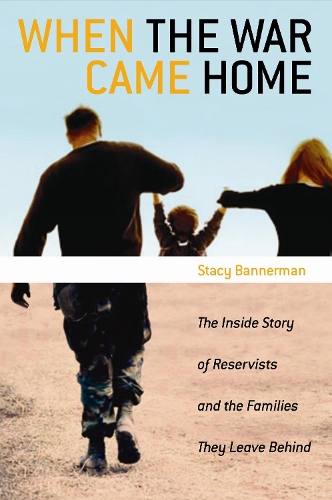
When the War Came Home: The Inside Story of Reservists and the Families They Leave Behind
(Hardback)
Publishing Details
When the War Came Home: The Inside Story of Reservists and the Families They Leave Behind
By (Author) Stacy Bannerman
Bloomsbury Publishing PLC
Continuum International Publishing Group Ltd.
1st May 2006
United Kingdom
Classifications
General
Non Fiction
Middle Eastern history
956.70443
Physical Properties
Hardback
240
510g
Description
In the ongoing war on terror, record numbers of Army National Guard reservists are being deployed overseas; more than 400,000 to date have been ordered into action. Nearly one fifth of them had already served their commitment to the U.S. Army, but through President Bush's stop-loss order, they have been forced to remain in Active Duty. Most of these reservists never thought they'd see war; some are blatantly opposed to it. Almost none are prepared for it; many are dangerously ill-equipped mentally, physically, and emotionally to wage war. They leave steady jobs and established careers, and they leave behind wives, husbands, partners, and families.
Stacy Bannerman is one of those left behind. When the War Came Home chronicles a journey that began when Stacy's husband Lorin, a forty-three-year-old Sergeant First Class who had never thought he'd be asked to wage war, was called to active duty as an Infantry Mortar Platoon Sergeant in October 2003 and remained on the front lines until spring 2005. When the War Came Home is Stacy's personal account of the emotional impact and oft-unreported realities of her home front experience during that time, something shared by thousands of reservists; spouses and partners. Unlike many of those others, Stacy has the singular viewpoint of being a high-profile career peace activist who ultimately finds herself at odds with her husband fighting on the front lines of Iraq. Stacy's voice and experience bridge the unique and the universal in a no-holds-barred memoir of war and of fighting for peace.
Reviews
"Bannerman is a career peace and human rights activist, whose husband, Lorin, a sergeant in the National Guard, was called up to serve in Iraq. She uses the challenges the couple faced in reconciling his war work with her peace work as a focal point of When the War Came Home... she makes important points, such as showing that the most passionate activism against war is not on college campuses but in the household of those with the most at stake, the primarily blue-collar military families. Bannerman also effectively conveys the isolation and lack of government support particular two National Guard families who operate on the military's second tier. What comes through loud and clear... is the enormous, and underreported, toll this war has taken on military families at home."- Emily Yellin, The Washington Post, May 3, 2006
Author Bio
Stacy Bannerman lives in Seattle. She is a high-profile career peace activist as well as a founder/executive director of Reconciliation Works in Washington.
